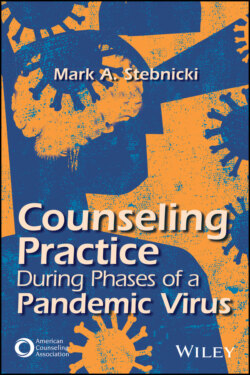Читать книгу Counseling Practice During Phases of a Pandemic Virus - Mark A. Stebnicki - Страница 11
A Pandemic Virus and a Mental Health Crisis
ОглавлениеIn the past several years, there has been a resurgence of interest within epidemiology in infectious diseases. Data are available from past pandemics (i.e., severe acute respiratory syndrome coronavirus 2, H1N1 flu, Ebola, Middle East respiratory syndrome, HIV/AIDS) to help guide medical practitioners in disease surveillance, medical evaluation, testing, prediction, preparation, and treatment. However, the same cannot be said of psychology, counseling, and disaster mental health response, which offer few guidelines to inform assessment, prevention, and mental health treatment during phases of a pandemic virus. Hence, the motivation for this unique work in mental health is to identify, recognize, prepare for, prevent, and apply therapeutic strategies for pandemic survivors. It is essential to have resources avail able to address issues related to the medical, physical, psychological, behavioral, and psychosocial impacts of a highly infectious disease in combination with a mental health crisis.
During the early phases of the 2020 COVID-19 pandemic, the refrain repeated in American popular culture was that “we are all in this together.” Also during 2020 were a rise in White nationalism, systemic racism, political divisiveness, the propagation of media-driven conspiracy theories, civil unrest, and economic disintegration, all interacting with this lethal virus to hinder the public health and safety of Americans. To complicate matters even further, there was an ongoing 20-year war on terrorism, cyberattacks on our homeland security infrastructure, and the insurrection at the Capitol on January 6, 2021. Overall, it is my contention that we are not all in this together, because this statement assumes that all persons are living life at the same level of medical, physical, and mental functioning.
The statement that “we are all in this together” also implies that we all enjoy the same benefits and privileges in terms of socioeconomic status, access to quality health care, jobs, civil rights, as well as adequate support systems and other resources. Thus, we are not all in this together. Many Americans do not recognize the seriousness and lethality of the COVID-19 pandemic based on their questioning of the use of vaccines, wearing masks, social and physical distancing, and other virus hygiene protocols. Instead of “We are all in this together,” I would offer the reframe “We are all our own best support system.” It is only when we can come together in the present moment that good things will unite our communities and regions. Until then, many Americans are surviving at a basic level instead of thriving.
The medical, physical, psychological, behavioral, psychosocial, and economic impacts of viral contagions have catastrophic impacts on individuals, groups, communities, and cultures. Pandemic viruses mimic other natural disasters, such as floods, hurricanes, tornadoes, wildfires, and earthquakes, all of which also occurred in 2020. However, a pandemic disaster involves other losses, such as the large-scale loss of life, health, jobs, careers, educational opportunities, social and entertainment activities, as well as many other things. This pandemic disaster is not confined to one geographic location. Rather, this viral contagion has had a global impact. All the calamity of 2020 will be etched and mapped into the human consciousness in an infinite number of ways. The result will be a historical trauma that lives in the mind, body, and spirit of humankind, much like the Black Death of the 14th and 17th centuries in Europe and the Spanish flu at the start of the 20th century in America.
